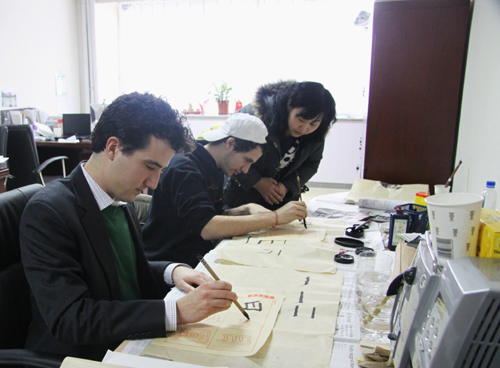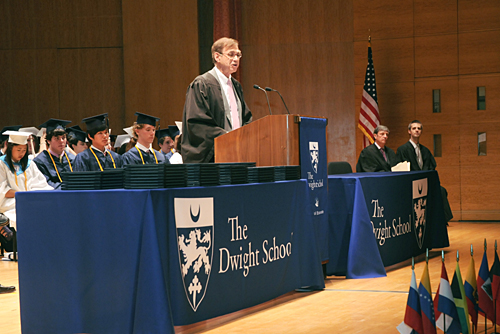
“I don’t speak a foreign language. It’s embarrassing,” said President Obama recently.
It is embarrassing, Mr. President, but it does not surprise me. You did not grow up like I did. Five different overseas schools and numerous cultures before I was 12, and then an international boarding school. My parents (with six children) were following a pay check and a conviction that world travel would give us a better life and make us global citizens with a richer appreciation of all humanity (my father made us study the language of every country we visited, because not to speak the language of your host country was quite frankly, uneducated!). So, now you’re wondering, can I produce a copy of my birth certificate? Yes, but while it will tell you that I am a British Citizen born in Georgetown, Guyana, my husband will tell you, “She’s a multi-national with an international rolodex to be envied.”
Some people talk about preparing children for the global world, others just do it, like my parents. And like Stephen Spahn, Chancellor of the Dwight School in New York City, who has established affiliate Dwight campuses in London, Vancouver Island, and Beijing, where Dwight has a joint diploma program with China’s Capital Normal High School (CNHS), a leading provincial high school. As an International Baccalaureate leader, Spahn’s vision is to educate students to make a difference nationally and internationally. Plans are currently underway for a South Korean Dwight school launch in 2012.
“The Chinese government valued Chancellor Spahn’s international mindedness, cultural sensitivity and expertise,” explains Dianne Drew, Principal of Dwight School in New York City and Project Manager of the school in China. “They also wished to improve admissions of Chinese students to American colleges, which the Chinese consider the best universities in the world.”
Mandarin study at Dwight in New York starts as a core subject from pre-school onwards with more intensive classes available from grades eight through 12. Other curriculum offerings include Asian cultural and history studies. Each student who participates in the program in China receives a diploma based on concurrent study of a full Chinese National Curriculum and a U.S. AP curriculum. The Dwight college guidance and admissions team assists Chinese students in their application process to American colleges.
I had the pleasure of speaking further with Chancellor Spahn about his roadmap to develop world leaders.
What is your global vision?
Our global vision, as an International Baccalaureate leader, is to build strong relationships between cultures around the world. We want to educationally integrate our campuses in New York, London, Beijing, Vancouver Island, and Seoul in 2012. Our personalized learning approach ignites a spark of genius in every student through a multi-grade mentoring system. We are expanding opportunities for all students and teachers to experience other cultures. Each individual country campus has unique strengths that can be shared with students at the other schools. For example, Korean and New York students will be equipped with the latest digital technology; the campus on Vancouver Island in Canada is a model of environmental sustainability (one-third of the faculty are organic farmers); the London and New York performing arts programs are equivalent to first-year college programs.
What were the challenges in founding the first American high school in China?
The first challenge was to build trust between our schools. When we started in 2007, Chinese students were almost exclusively exam-focused. We had to teach them that learning does not end with an AP exam but that it is an ongoing lifelong process. We thought that the Chinese would have a strict censorship policy. However, we discovered that all of the literary works we taught in New York were able to be taught in Beijing. We have successfully met the challenge of educating Chinese parents on the full spectrum of American universities available to their children. Sixty students are about to receive both a Dwight and a CNHS Diploma. Our first graduation will be held on June 10. All graduating Chinese students have been admitted to leading American Universities.
What are your next steps relating to China?
Our relationship with our school in China will continue to foster international mindedness amongst our students and faculty. Over the last three years, we have had teacher exchange opportunities where we have shared best teaching and learning practices. Our students have travelled to Capital Normal, and this summer we will send six students and one teacher to Beijing for a summer camp opportunity; they will live with CNHS families as guests of the Beijing government. Our program has been a steep but enriching learning curve for both schools. We are moving towards strengthening our ties even further as we make a joint application for the Confucius classroom program run by the Chinese government to promote language and cultural studies. We have been proud to be an instrumental part of preparing Chinese students for Western education models and for their eventual acceptance into North American colleges and universities. We equally want our students to be open to exploring China’s university education and rich culture by having more exchange opportunities in Beijing. We recognize that global sensitivity and expertise will be crucial for future success and for developing world leaders.

Why South Korea 2012?
Korea is a significant player in the Asian community from an educational and economic standpoint. Dwight was selected from a review of over 100 leading schools around the world to be the International Baccalaureate model for the Korean educational system. 540 students, grades K-12, will be enrolled starting September 2012. We will also act as the regional center for all the IB schools in Korea. The Dwight International School Seoul is being built by the Seoul municipal government. With the opening of the new campus in September 2012, the school in Seoul will offer training programs for IB teachers and will be the center to share IB best practices with interested Korean schools.
World Wisdom — An excerpt borrowed from Chancellor Spahn’s Chinese graduation speech:
“School is a place that is built on dreams. Dreams where each individual is encouraged to blaze a path where none existed. School is a place that is never stuck in the past, but always honors tradition. It is a place that embraces innovation with all its different and difficult challenges. It is a place that honors teamwork and comradeship, but still guides every individual through his or her own unique path. Dare to dream – to have the courage to take risks – to be a person of action – to make service count – to fill every unforgiving minute with 60 seconds worth of distance run – to acknowledge we only have 24 hours in any day and we should use them in ways that make us proud and nurture our spark of genius, to build a better world.”

In The Global Search for Education, join C.M. Rubin and globally renowned thought leaders including Sir Michael Barber (UK), Dr. Leon Botstein (US), Dr. Linda Darling-Hammond (US), Dr. Madhav Chavan (India), Professor Michael Fullan (Canada), Professor Howard Gardner (US), Professor Yvonne Hellman (The Netherlands), Professor Kristin Helstad (Norway), Professor Rose Hipkins (New Zealand), Professor Cornelia Hoogland (Canada), Mme. Chantal Kaufmann (Belgium), Professor Dominique Lafontaine (Belgium), Professor Hugh Lauder (UK), Professor Ben Levin (Canada), Professor Barry McGaw (Australia), Sridhar Rajagopalan (India), Sir Ken Robinson (UK), Professor Pasi Sahlberg (Finland), Andreas Schleicher (PISA, OECD), Dr. David Shaffer (US), Chancellor Stephen Spahn (US), Yves Theze (Lycee Francais US), Professor Charles Ungerleider (Canada), Professor Tony Wagner (US), Professor Dylan Wiliam (UK), Professor Theo Wubbels (The Netherlands), Professor Michael Young (UK), and Professor Minxuan Zhang (China) as they explore the big picture education questions that all nations face today. The Global Search for Education Community Page
C. M. Rubin is the author of two widely read online series for which she received a 2011 Upton Sinclair award, “The Global Search for Education” and “How Will We Read?” She is also the author of three bestselling books, including The Real Alice in Wonderland.

Recent Comments